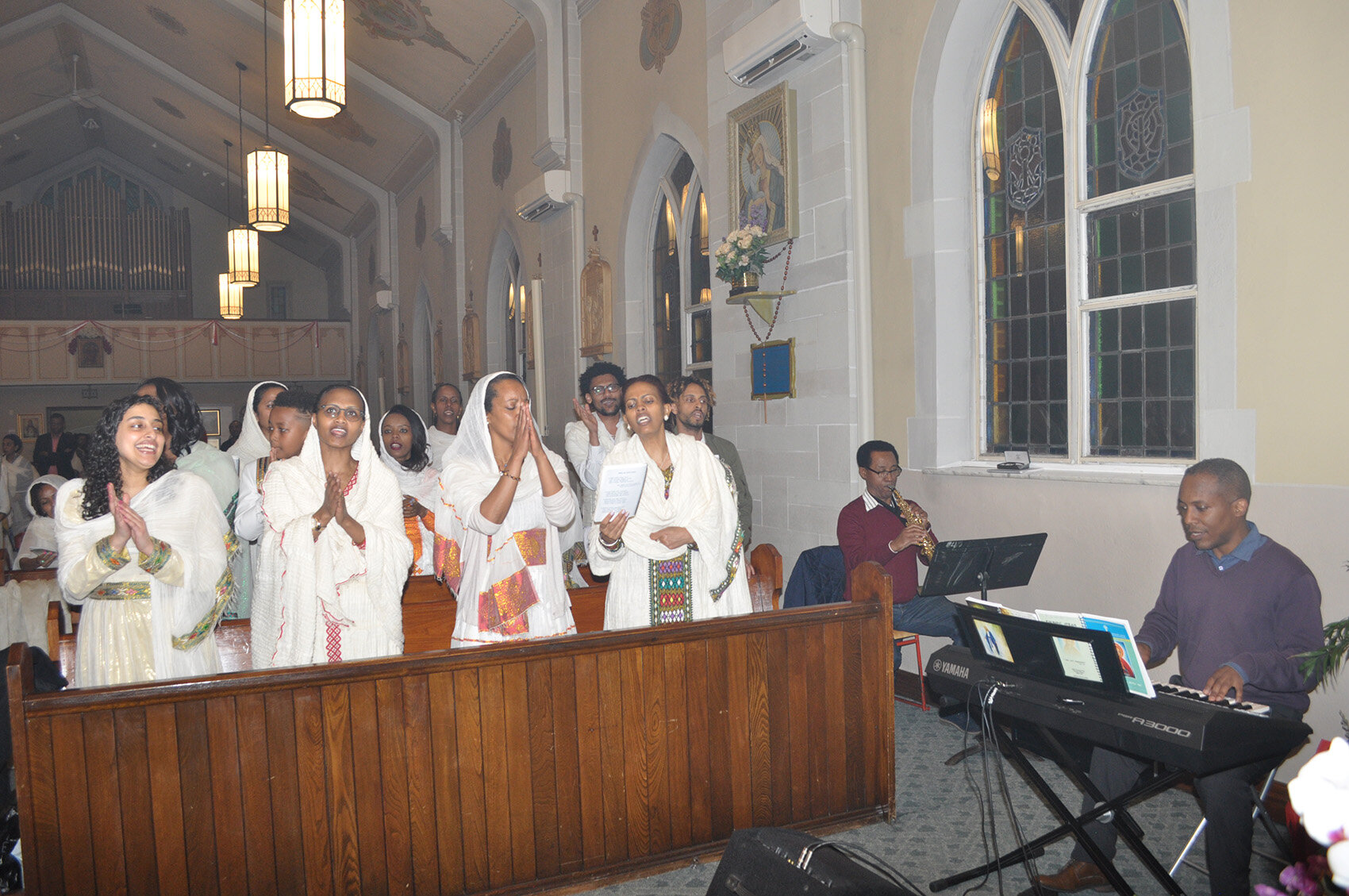
Choir
“Let the word of Christ dwell in you richly in all wisdom; teaching and admonishing one another in psalms and hymns and spiritual songs, singing with grace in your hearts to the Lord. ”
“Praise ye the LORD. Sing unto the LORD a new song, and his praise in the congregation of saints. Let Israel rejoice in him that made him: let the children of Zion be joyful in their King. Let them praise his name in the dance: let them sing praises unto him with the timbrel and harp.”
Music in The Church
Singing and music has been an important part of the practice of Christianity since its beginning, as a means of elevating the celebration of Mass to enhance its beauty and solemnness as well as the spiritual experience of the celebrants. In the old testament, Psalms 149:1 says "Praise ye the LORD. Sing unto the LORD a new song, and his praise in the congregation of saints." Catechism of the Catholic Church in paragraph1156 mentions that “The composition and singing of inspired psalms, often accompanied by musical instruments, were already closely linked to the liturgical celebrations of the Old Covenant. The Church continues and develops this tradition” In the new testament, Colossians 3:16 says “Let the word of Christ dwell in you richly in all wisdom; teaching and admonishing one another in psalms and hymns and spiritual songs, singing with grace in your hearts to the Lord.”
The centrality of music and song to elevating liturgy was so well recognized that there were institutions such as the Choir dedicated to it. This institution overtime produced a cohort of faithful who went on serve important roles in the Church such as the role of the Pope. As Catechism of the Catholic Church in paragraph1156 further states "The musical tradition of the universal Church is a treasure of inestimable value, greater even than that of any other art.” Thus, from Medieval times until Reformation, the history of music was essentially synonymous with the history of church music. “The main reason for this pre-eminence is that, as a combination of sacred music and words, it forms a necessary or integral part of solemn liturgy."
Sacred music and singing in a liturgical celebration give spiritual uplifting and joy to all celebrants of the word of God. Of this sacred Ministry, Saint Augustine, one of the great forefathers of the Church in the 4th century, skilled theologian and prolific preacher, rhetorician and confessor formally recognized as a Doctor of the Church, asserts that prayer is made more efficacious when combined with song. He is known to have said “he who sings, prays twice.”
 In the Ethiopian Catholic Church’s liturgical rite celebrated in the Ge'ez language, Saint Yared has made an invaluable contribution to this sacred tradition. Saint Yared, an Ethiopian composer, scholar, and pioneer of musical notation, who lived in the beginning of the 6th century, focused his studies on the Holy Scriptures. He composed a system of musical notation to sing Ge’ez liturgical hymns into four segments representing the four seasons of the year, winter, summer, spring, and autumn, each with their own melodies reflecting the Holy Trinity.
In the Ethiopian Catholic Church’s liturgical rite celebrated in the Ge'ez language, Saint Yared has made an invaluable contribution to this sacred tradition. Saint Yared, an Ethiopian composer, scholar, and pioneer of musical notation, who lived in the beginning of the 6th century, focused his studies on the Holy Scriptures. He composed a system of musical notation to sing Ge’ez liturgical hymns into four segments representing the four seasons of the year, winter, summer, spring, and autumn, each with their own melodies reflecting the Holy Trinity.He had a passion for music and authored several religious hymns and songs which expressed a form of musical syncretism. He compiled his work in the Book of Digua consisting chants of sorrow and tearful songs. Saint Yared is a major innovator in the development of medieval music in Ethiopia. His musical articulations are ten in total: Yizet, Deret, Rikrik, Difat, Cheret, Qenat, Hidet, Qurt, Dirs, and Anbir. Each has a specific meaning. [i]
The primary role of the choir is thus to spiritually join the priest in the celebration of Mass to praise and glory God by singing and praying. To make a good choir demands dedicated members who love to sing or play instruments; and most importantly, a willingness on the part of all to be available for practice and celebrations at the requisite time.
Lideta Mariam choir meets regularly on Tuesday nights for choir practice at 6:00 pm and on Sundays before mass at 1:30 pm. If you are interested in joining this choir, please contact us at lmethiocatholic@gmail.com
[i] Retrieved from http://www.tadias.com/11/29/2007/st-yared-the-great-ethiopian-composer/




